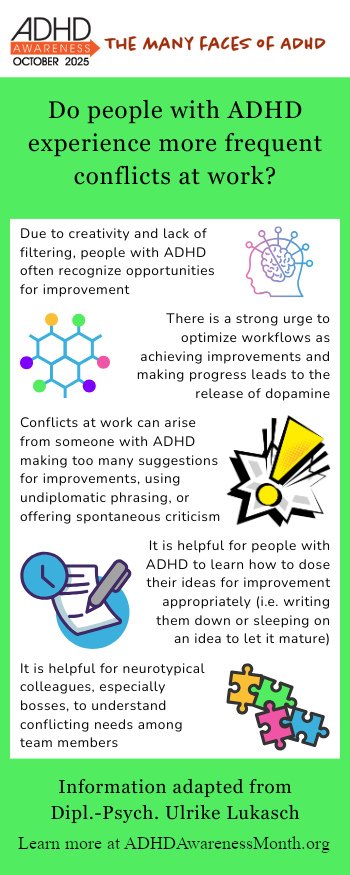People with ADHD often discover improvements in their jobs. However, they frequently encounter resistance when offering spontaneous criticism. Mutual understanding and constructive sharing of ideas foster team spirit and added value.
Dissatisfaction and conflicts in the workplace occur more often among people with ADHD. In my experience, a common cause is that individuals with ADHD, due to their creativity and lack of filtering, often have an exceptionally good eye for opportunities to improve things. They find it painfully distressing when processes are perceived as cumbersome. As a result, they have a strong urge to optimize workflows.
Achieving improvements and making progress provides good stimulation, which leads to dopamine release. People with ADHD therefore like to question everything. This can often lead to valuable improvements at work. Well-established processes are not always practical. However, this can also result in too many suggestions for improvements and sometimes undiplomatic phrasing, which can lead to conflicts. The expected recognition is often lacking.
Due to the typical ADHD-related reduced impulse control, an idea is quickly voiced. There may even be a fierce struggle to implement it. The impulse control needed to proceed diplomatically or to choose the right moment is missing. Suggestions for improvement simultaneously represent criticism of the current system—criticism of the boss or colleagues.
People with ADHD need change to feel sufficiently stimulated. Neurotypical people quickly feel stressed and overwhelmed by changes; they do not love change to the same extent as those with ADHD.
It is helpful for people with ADHD to become aware of this and to learn how to dose their ideas for improvement appropriately: The wonderful ability to quickly generate many ideas for improvement will be much more appreciated if it is well dosed. Suggestions for improvement are quickly perceived as criticism.
Depending on the situation, it may be useful to write down ideas rather than immediately voice them. Ideally, pause and set a stop. Become aware: “At the right moment, my good idea will be much better received and appreciated.” Sleeping on an idea, letting it mature overnight, also has a good filtering effect (the wild ideas fall away). This way, the best ideas can be filtered out and presented at the right time, and perhaps even implemented.
It is also helpful for neurotypical colleagues, especially for bosses, to understand these conflicting needs among different team members.
In the best case, it is then possible to find common ground that is achievable and enriching for everyone.
About the Author

Dipl.-Psych. Ulrike Lukasch, born in 1969, married, two children, licensed psychological psychotherapist since 1998, practicing in her own clinic since 2000 in Windsbach, Germany. Behavioural therapist with specializations in hypnotherapy and ADHD.

